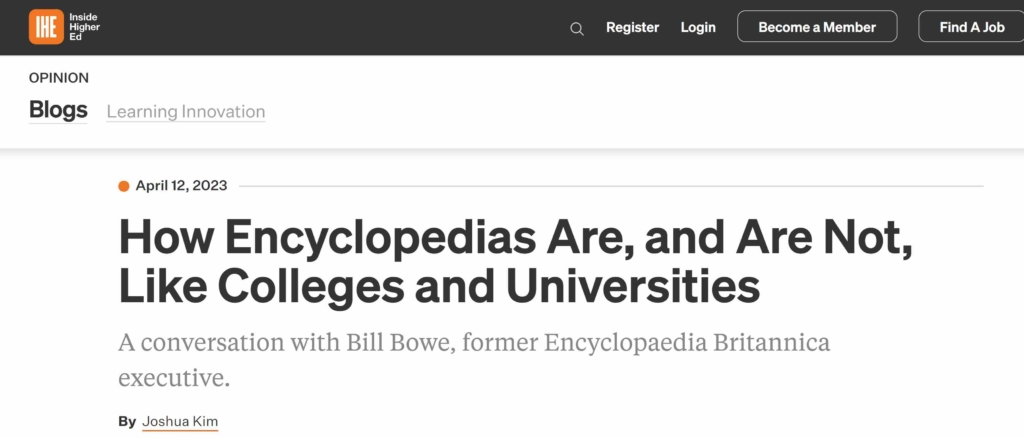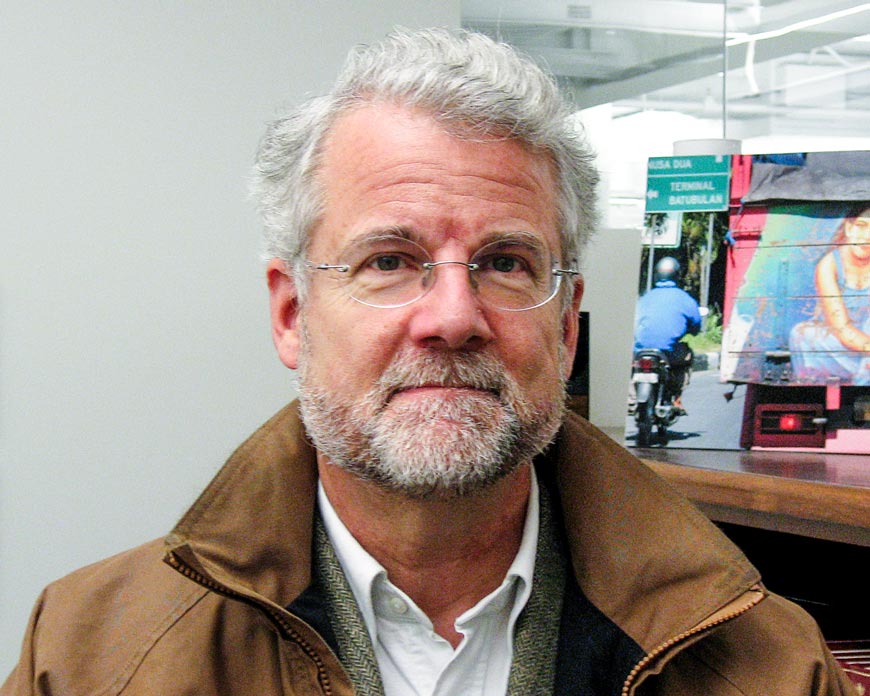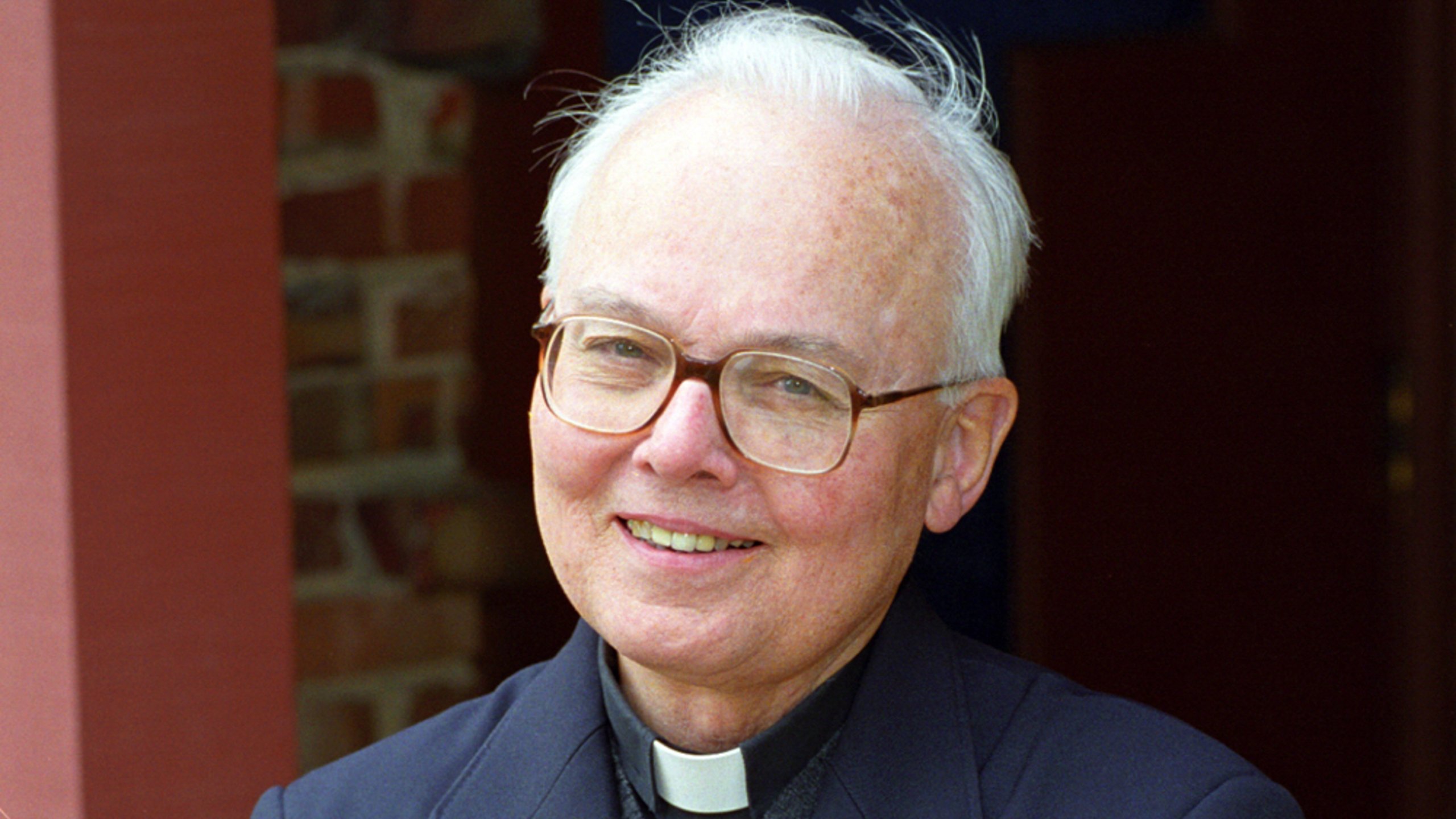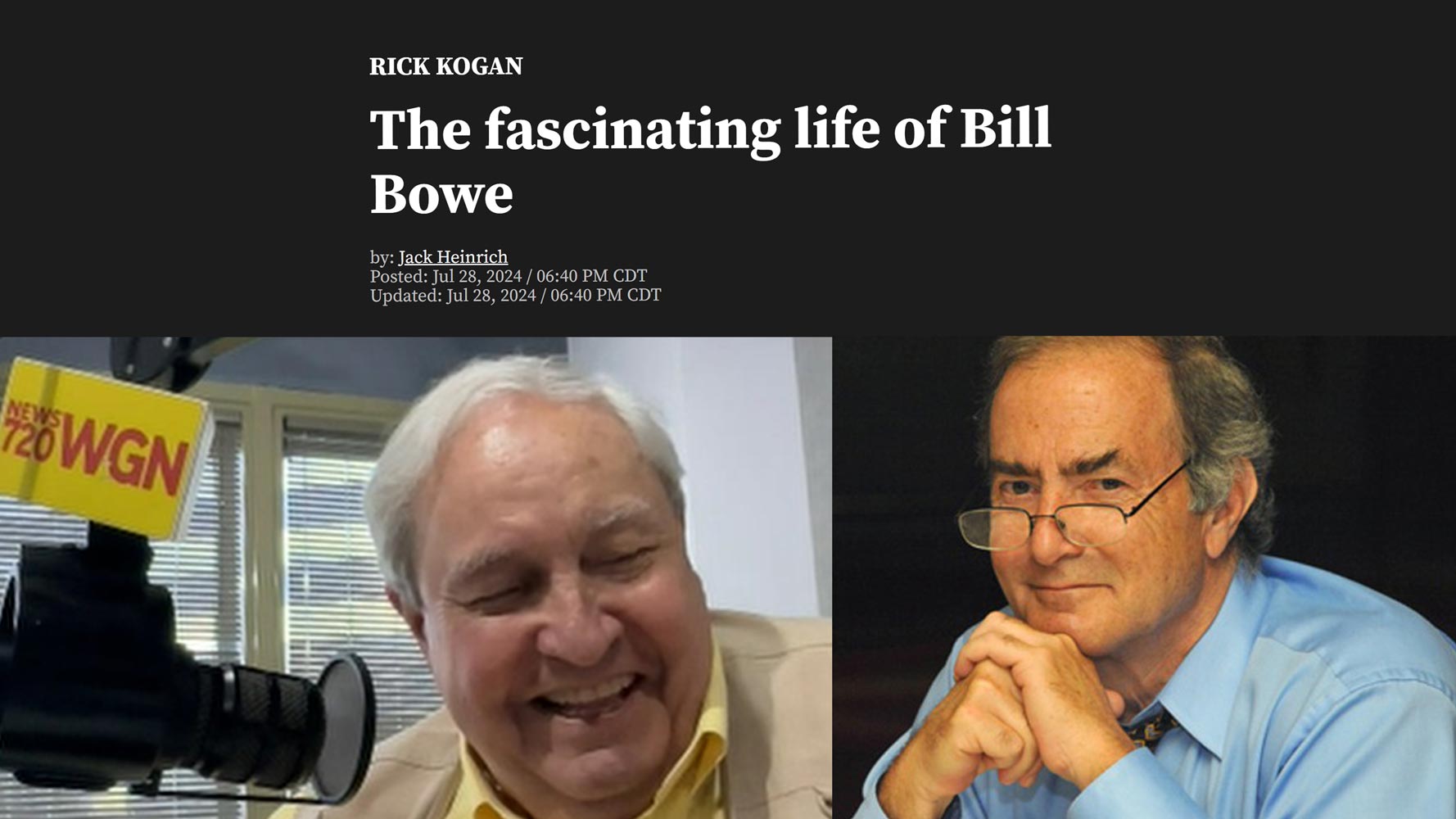

Bill Bowe
Editor’s Note: Joshua Kim is Dartmouth College’s Director of Online Programs
and Strategy and a Senior Fellow for Academic Transformation, Learning, and Design at the Center for New Designs in Learning & Scholarship (CNDLS) at Georgetown University. He has a Ph.D. in sociology and demography from Brown University and is best known for his daily blog on Technology and Learning at InsideHigherEd.com, a website that receives over 2.25 million unique monthly visitors.
While I was acquainted with Josh in 1999 when he briefly joined Encyclopaedia Britannica, I only recently came across him again when I noticed his review of Simon Garfield’s new book, All the Knowledge in the World: The Extraordinary History of the Encyclopedia on the InsideHigherEd.com website. Remembering him from long ago, I contacted him. Below is what Josh later published in Inside Higher Ed.
________________________

Joshua M. Kim
Bill Bowe reached out after reading Print Encyclopedias, Universities and ‘All the Knowledge in the World’. He and I overlapped at Britannica for a few years, as Bill was its long-serving (1986-2014) Executive Vice President and General Counsel. In his note, Bill shared a link to a chapter in his online memoir titled “Inventing the Future – Encyclopaedia Britannica”. For students of the history of technology and ideas, the chapter detailing Britannica’s role in the creation of multimedia is well worth reading. In connecting with Bill, I became curious about his thoughts relating encyclopedias to higher education. He graciously agreed to participate in this conversation.
Q1. When I first went to work for Britannica in 1999, the company’s brand was enormously valuable. I’d argue that the Britannica brand at that time enjoyed as much cultural capital as today’s most well-known and revered colleges and universities. Today, Britannica no longer published a print edition, and the Britannica brand is a shadow of its former self. Are there lessons from the Britannica story for colleges and universities?
A1. To begin with, I think your premise is correct. In the nineteenth and twentieth centuries, Encyclopaedia Britannica did enjoy a global reputation as a unique and important cultural and educational institution. I also think Britannica was on an equal plane in that regard with the leading colleges and universities of the day. That’s not a bad achievement for a company publishing an eponymous bunch of books sitting on a shelf most of the time. I also agree with you that in the twenty-first century, Britannica is no longer top of mind in that same way.
I disagree with your conclusion that Britannica is “a shadow of its former self” because it stopped publishing the print edition. You may be astonished to learn that though the print set stopped being published after its 2010 copyright edition, Britannica’s internet publication Britannica.com now enjoys over 7 billion page views annually, is available in over 20 languages, and is used in more than 150 countries by more than 150 million students. The print set’s prior audience absolutely pales in comparison to Britannica’s reach today. Britannica may no longer be publishing its bunch of books, but streaming its bunch of electrons along cables and through the ether like that isn’t chopped liver either.
Now, in answer to your question, I think there is a lesson for colleges and universities from Britannica’s evolution through the dawn of the digital age. In a period of secular stress, with the society around you changing in major ways, your institution’s survival may well turn on how well you manage your always scarce resources. Waste not, want not is as true a maxim today as it ever was. The extraordinary administrative bloat in the academy in recent decades simply may not be able to survive the economic stresses that demographic and technology changes have in store for higher education in the years ahead.
More importantly, as in the case of Britannica, institutional continuity is likely to turn on whether a college or university has kept its focus not only on what it does best, but also on whether the society at large continues to believe that what it does is really useful.
Q2. In reading your chapter on Britannica in your memoir, it is clear that far from being a technological laggard, Britannica was instead a pioneer. And yet, Encyclopaedia Britannica was not able to evolve fast enough in the internet age to survive as a cultural and economic force. Why was Britannica not able to adapt to the technological, social, and business shifts that enabled Wikipedia to prosper after its founding in 2001 while the fortunes of Britannica waned?
A2. It’s true Britannica was an unlikely technology pioneer by advancing the human/machine interface early in the digital age. And it is also true that Britannica today is no longer perceived as the cultural force it once was. However, you’re wrong in saying Britannica is no longer the economic force it once was.
The truth of the matter is that Britannica was never much of an economic force, even back in the day. Its margins were always thin due to high manufacturing costs. Remember that sets of its 15th Edition had 32 volumes, each with 1,000 pages of expensive, highly specialized paper (thin, strong, and opaque). Added to that were the high costs associated with the many salespeople who made their living selling sets. It wasn’t until 1996 that the economics of the company had changed sufficiently to force both a change of ownership and the end of the company’s direct selling era.
That said, though Britannica never was a Fortune 500 company or even close to being one, between 1943 and 1995, with its close association with the University of Chicago, it did manage to send over $200 million to the University in royalties and the proceeds from Britannica’s sale in 1996.
Manufacturing and distribution costs were reduced dramatically with the coming of the internet, but while margins improved the company shrank in both revenues and the number of employees. Today, its employees are largely split between software engineers and editors, with a very thin administrative staff. Its consumer subscription market today is relatively small. Its primary revenue now comes from institutions — schools and libraries worldwide. In short, Britannica is still a cultural force doing good in the world by purveying curated knowledge. But it’s not today, and never has been, an economic force.
For that matter, with unpaid non-professionals writing its articles, Wikipedia isn’t much of an economic force today either. Though Wikipedia is free, schools and libraries worldwide largely steer clear of it. That is what opened up the vastly larger audience worldwide that professionally edited Britannica has today, compared to yesterday. While it’s hard to compete with free, Britannica has been able to do so by remaining good at what it does best, and staying uniquely useful to the institutional, if not the consumer, audience.
Q3. From your decades as an executive at Encyclopaedia Britannica, what advice might you offer to leaders of colleges and universities in their desire to maintain their brand value and stay relevant across the decades to come?
A3. First, I believe that colleges and universities in the United States are headed into an unusual period of economic and social turbulence. Macro demographic changes in the immediate years ahead will continue to shrink the pool of potential higher education students. This is likely to continue to pressure the economic position of second and third level institutions. Some won’t make it, and others will survive only by addressing current staffing levels and the current administrative ratio to the student population.
Second, the kind of technology changes Britannica faced in transiting from print to the internet are going to be replaced by the much more challenging disruption coming from the advances being made in Artificial Intelligence. This new technology is certain to roil Britannica again, and I’m sure it will also roil the structures of colleges and universities.
Finally, I think colleges and universities that continue to thrive will be those that remember what they’re good at doing that is preeminently in their realm. Those that don’t may be subject to being discarded by society at large as insufficiently useful. I worry that as many colleges and universities continue to have serious trouble maintaining an atmosphere open to airing different modes of thought, some are going to buckle. This won’t be just because they’re under pressure from the coming demographic and technology changes. If it evolves that they are increasingly viewed as culturally and politically out of step with the society at large, their current monopoly position in higher education risks being undermined by all of the above.










